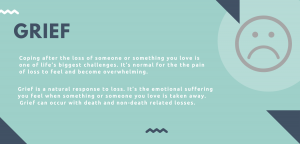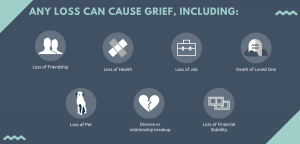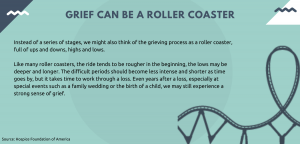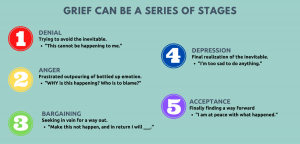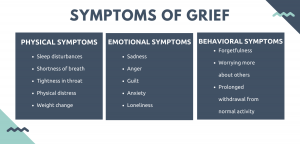Student Health & Counseling Center
Home » Resources » Student Health & Wellness » Emotional Wellness » Grief & Loss
MenuEmotional Wellness
Grief
Coping after the loss of someone or something you love is one of life’s biggest challenges. It’s normal for the the pain of loss to feel and become overwhelming. Grief is a individual and unique experience. Please remember that there is no right or wrong way to grieve.
What is Grief?
Even subtle losses in life can trigger a sense of grief. For example, you might grieve after moving away from home, graduating from college, or changing jobs. Whatever your loss, it’s personal to you, so don’t feel ashamed about how you feel, or believe that it’s somehow only appropriate to grieve for certain things. If the person, animal, relationship, or situation was significant to you, it’s normal to grieve the loss you’re experiencing.
Whatever the cause of your grief, there are healthy ways to deal with the pain and eventually come to terms with your loss. Grief is a unique experience. Some may experience grief like a roller coaster, while others may experience grief throughout a series of stages.
Symptoms of Grief:
- Shock and disbelief. Right after a loss, it can be hard to accept what happened. You may feel numb, have trouble believing that the loss really happened, or even deny the truth. If someone you love has died, you may keep expecting them to show up, even though you know they’re gone.
- Sadness. Profound sadness is probably the most universally experienced symptom of grief. You may have feelings of emptiness, despair, yearning, or deep loneliness. You may also cry a lot or feel emotionally unstable.
- Guilt. You may regret or feel guilty about things you did or didn’t say or do. You may also feel guilty about certain feelings (e.g. feeling relieved when the person died after a long, difficult illness). After a death, you may even feel guilty for not doing something to prevent the death, even if there was nothing more you could have done.
- Anger. Even if the loss was nobody’s fault, you may feel angry and resentful. If you lost a loved one, you may be angry with yourself, God, the doctors, or even the person who died for abandoning you. You may feel the need to blame someone for the injustice that was done to you.
- Fear. A significant loss can trigger a host of worries and fears. You may feel anxious, helpless, or insecure. You may even have panic attacks. The death of a loved one can trigger fears about your own mortality, of facing life without that person, or the responsibilities you now face alone.
Take Care of Yourself as You Grieve:
When you’re grieving, it’s more important than ever to take care of yourself. The stress of a major loss can quickly deplete your energy and emotional reserves. Looking after your physical and emotional needs will help you get through this difficult time.
Face your feelings. You can try to suppress your grief, but you can’t avoid it forever. In order to heal, you have to acknowledge the pain. Trying to avoid feelings of sadness and loss only prolongs the grieving process. Unresolved grief can also lead to complications such as depression, anxiety, substance abuse, and health problems.
Express your feelings in a tangible or creative way. Write about your loss in a journal. If you’ve lost a loved one, write a letter saying the things you never got to say; make a scrapbook or photo album celebrating the person’s life; or get involved in a cause or organization that was important to your loved one.
Try to maintain your hobbies and interests. There’s comfort in routine and getting back to the activities that bring you joy and connect you closer to others can help you come to terms with your loss and aid the grieving process.
Don’t let anyone tell you how to feel, and don’t tell yourself how to feel either. Your grief is your own, and no one else can tell you when it’s time to “move on” or “get over it.” Let yourself feel whatever you feel without embarrassment or judgment. It’s okay to be angry, to yell at the heavens, to cry or not to cry. It’s also okay to laugh, to find moments of joy, and to let go when you’re ready.
Plan ahead for grief “triggers.” Anniversaries, holidays, and milestones can reawaken memories and feelings. Be prepared for an emotional wallop, and know that it’s completely normal. If you’re sharing a holiday or life cycle event with other relatives, talk to them ahead of time about their expectations and agree on strategies to honor the person you loved.
Look after your physical health. The mind and body are connected. When you feel healthy physically, you’ll be better able to cope emotionally. Combat stress and fatigue by getting enough sleep, eating right, and exercising. Don’t use alcohol or drugs to numb the pain of grief or lift your mood artificially.
(Retrieved from: Help Guide)
More Information:
Local Resources:

